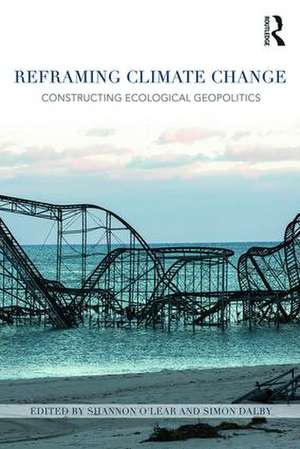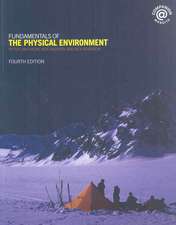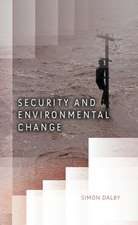Reframing Climate Change: Constructing ecological geopolitics
Editat de Shannon O'Lear, Simon Dalbyen Limba Engleză Paperback – 6 aug 2015
The volume draws from multiple perspectives and disciplines to cover a broad scope of climate change. Chapter topics range from climate science and security to climate justice and literacy. Although these familiar concepts are widely used by scholars and policy-makers, they are discussed here as frequently problematic when used as lenses through which to study climate change. Beyond merely reviewing current trends within these different approaches to climate change, the collection offers a thoughtful assessment of these approaches with an eye towards an overarching reconsideration of the current understanding of our relationship to climate change.
Reframing Climate Change is an essential resource for students, policy-makers, and anyone interested in understanding more about this important topic. Who decides what the priorities are? Who benefits from these priorities, and what kinds of systems or actions are justified or hindered? The key contribution of the book is the outlining of ecological geopolitics as a different way of understanding human–environment relationships including and beyond climate change issues.
| Toate formatele și edițiile | Preț | Express |
|---|---|---|
| Paperback (1) | 477.82 lei 6-8 săpt. | |
| Taylor & Francis – 6 aug 2015 | 477.82 lei 6-8 săpt. | |
| Hardback (1) | 1001.07 lei 6-8 săpt. | |
| Taylor & Francis – 4 aug 2015 | 1001.07 lei 6-8 săpt. |
Preț: 477.82 lei
Nou
Puncte Express: 717
Preț estimativ în valută:
91.43€ • 95.70$ • 76.10£
91.43€ • 95.70$ • 76.10£
Carte tipărită la comandă
Livrare economică 31 martie-14 aprilie
Preluare comenzi: 021 569.72.76
Specificații
ISBN-13: 9781138794375
ISBN-10: 1138794376
Pagini: 240
Ilustrații: 3 black & white illustrations, 2 black & white halftones, 1 black & white line drawings
Dimensiuni: 156 x 234 x 13 mm
Greutate: 0.34 kg
Ediția:1
Editura: Taylor & Francis
Colecția Routledge
Locul publicării:Oxford, United Kingdom
ISBN-10: 1138794376
Pagini: 240
Ilustrații: 3 black & white illustrations, 2 black & white halftones, 1 black & white line drawings
Dimensiuni: 156 x 234 x 13 mm
Greutate: 0.34 kg
Ediția:1
Editura: Taylor & Francis
Colecția Routledge
Locul publicării:Oxford, United Kingdom
Cuprins
1. Introduction: Reframing the climate change discussion Shannon O’Lear and Simon Dalby 2. Postmodern interpretations Leigh Glover 3. The climate of communication: from detection to danger Chris Russill 4. Disconnecting climate change from conflict: a methodological proposal Emily Meierding 5. Climate justice: climate change, resource conflicts and social justice Paul Routledge 6. Climate change and the insecurity frame Simon Dalby 7. Geopolitics and climate science: the case of the missing embodied carbon Shannon O’Lear 8. Technology and politics in the Anthropocene: visions of "solar radiation management" Thilo Wiertz 9. Biofuels: climate solution or environmental pariah? James Smith and Shaun Ruysenaar 10. Novel framings create new, unexpected allies for climate activism Andrew Szasz 11. Catastrophe insurance and the biopolitics of climate change adaptation Kevin J. Grove 12. Resisting climate security discourse: restoring "the political" in climate change politics Angela Oels 13. Towards ecological geopolitics: climate change reframed Simon Dalby and Shannon O’Lear
Recenzii
"Climate change means different things to different people in different places. It does not have one cause and one solution, but many causes and many solutions. In Reframing Climate Change, O’Lear and Dalby have brought together an impressive group of political geographers and scientists who undermine the conventional singular narrative of climate change – ‘the plan’ as some have dubbed it – before helpfully opening up different ways of framing what is at stake. It is only with such a pluralist account of climate change that the business of politics can get done: to expose, argue over and decide between different visions people have of how the world should be."
Mike Hulme, Professor of Climate and Culture in the Department of Geography, King’s College London, UK
"This book is essential reading for those who see or sense that climate change is more than an environmental issue. The authors argue that it is critical to challenge conventional framings of both problems and solutions by bringing in politics, power and new perspectives. Reframing Climate Change unravels some key assumptions that have the potential to transform approaches to security in the Anthropocene."
Karen O'Brien, Professor in the Department of Sociology and Human Geography, University of Oslo, Norway
Mike Hulme, Professor of Climate and Culture in the Department of Geography, King’s College London, UK
"This book is essential reading for those who see or sense that climate change is more than an environmental issue. The authors argue that it is critical to challenge conventional framings of both problems and solutions by bringing in politics, power and new perspectives. Reframing Climate Change unravels some key assumptions that have the potential to transform approaches to security in the Anthropocene."
Karen O'Brien, Professor in the Department of Sociology and Human Geography, University of Oslo, Norway
Notă biografică
Shannon O’Lear is a Professor at the University of Kansas, USA, where she has a joint appointment in the Departments of Geography and Environmental Studies. She is the author of Environmental Politics: Scale and Power (2010). She has published widely on energy and natural resources, environmental security, and critical geopolitics of the environment.
Simon Dalby is CIGI Chair in the Political Economy of Climate Change at the Balsillie School of International Affairs and Professor of Geography and Environmental Studies at Wilfrid Laurier University, Waterloo, Canada. His previous books include Creating the Second Cold War (1990), Environmental Security (2002), and Security and Environmental Change (2009).
Simon Dalby is CIGI Chair in the Political Economy of Climate Change at the Balsillie School of International Affairs and Professor of Geography and Environmental Studies at Wilfrid Laurier University, Waterloo, Canada. His previous books include Creating the Second Cold War (1990), Environmental Security (2002), and Security and Environmental Change (2009).
Descriere
"Change the system, not the climate" is a common slogan of climate change activists. Yet when this idea comes into the academic and policy realm, it is easy to see how climate change discourse frequently asks the wrong questions. Reframing Climate Change encourages social scientists, policy-makers, and graduate students to critically consider how climate change is framed in scientific, social, and political spheres. It proposes ecological geopolitics as a framework for understanding the extent to which climate change is a meaningful analytical focus, as well as the ways in which it can be detrimental, detracting attention from more productive lines of thought, research, and action.
Reframing Climate Change is an essential resource for students, policy-makers, and anyone interested in understanding more about this important topic. Who decides what the priorities are? Who benefits from these priorities, and what kinds of systems or actions are justified or hindered? The key contribution of the book is the outlining of ecological geopolitics as a different way of understanding human–environment relationships including and beyond climate change issues.
Reframing Climate Change is an essential resource for students, policy-makers, and anyone interested in understanding more about this important topic. Who decides what the priorities are? Who benefits from these priorities, and what kinds of systems or actions are justified or hindered? The key contribution of the book is the outlining of ecological geopolitics as a different way of understanding human–environment relationships including and beyond climate change issues.









